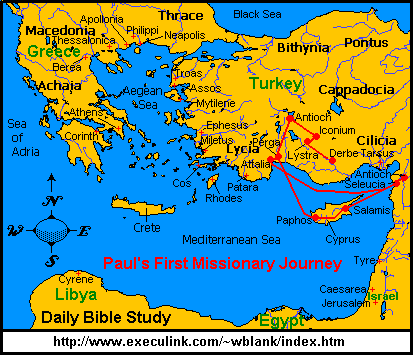- Acts 4:32-37. What prompted the apostles to give Joseph the "nickname" Barnabas? Could this name have been applied equally well to the other believers? What was the reason for their unusual acts of generosity?
Acts 9:26-30. Why was it necessary for Barnabas to act as Saul's advocate when he tried to join the Jerusalem church? How did Barnabas convince the apostles of Saul's sincerity and what was the outcome?
Acts 11:19-26. How did Barnabas respond to the unprecedented situation he encountered at Antioch of Syria? Consider the importance for the subsequent history of the Christian Church of his decision to involve Saul in the developing Gentile mission.
Acts 13:1-2. What was the special work for which Barnabas and Saul were dedicated by the church at Antioch in response to the Holy Spirit? What does this say to you about the way in which appointments should be made in the Church today?
Acts 13:4-14:28. Trace the progress of Barnabas and Saul's missionary journey.
(As indicated on the map below, this journey is often referred to as 'Paul's First Missionary Journey'. For a reason you will discover in question 7, it was the only one undertaken jointly by Barnabas and Paul.)

(The above map is reproduced by kind permission of Wayne Blank, author of the Daily Bible Study website, which may be accessed via our Links to Other Websites.)
Some particular things we would encourage you to focus upon in the account of the journey are:
- To whom was Barnabas and Saul's preaching at first directed (13:16)?
- What was the essence of their message (13:38-41)?
- What did the apostles encourage their followers to do (13:43)? Are you doing the same?
- What prompted the Jews in Antioch of Pisidia to reject the gospel, but the Gentiles to receive it gladly (13:45-48)?
- How did the Jew's rejection of the gospel pave the way for the expansion of the apostles' ministry (13:49-52, 14:1-7, and 14:19-20)?
- How did Barnabas and Paul respond to the adulation of the people of Lystra, and how did they turn it into an opportunity for preaching (14:8-18)?
- How did Paul and Barnabas strengthen the believers during their return journey from Derbe to Antioch of Pisidia (14:22-23)? Consider both the practical as well as the spiritual aspects. What do their activities say to you about the role of itinerant ministers in our own day?
(For further reflection we would suggest that you read Romans 10 and 11. In these two chapters Paul explains how God includes both Jews and Gentiles alike in his great scheme of redemption.)
Acts 15:36-41. What gave rise to the dispute between Paul and Barnabas, and what was its outcome? What evidence does Scripture offer of a subsequent reconciliation between the two apostles (1 Corinthians 9:6) and of John Mark's later reinstatement to service with Paul (Colossians 4:10, 2 Timothy 4:11, Philemon 24)?
Galatians 2:11-21. A gentle character may easily do the wrong thing for the sake of apparent peace (J Stafford Wright). Do you consider this assessment of Barnabas to be justified in the light of his conduct over the matter of meals with Gentile converts at Antioch, considering the vital principle that was at stake?
Personal Applications
- It is said of Barnabas that he was a good man, full of the Holy Spirit and strong in faith (Acts 11:24). Can this also be said of you?
- Having focussed on Barnabas' career as an encourager, consider ways in which you could become a son of encouragement (or daughter of encouragement) in your various spheres of influence (e.g. church, home, place of work or study, leisure pursuits.)
|
 For our fourth Bible Focus we consider the life and work of one of the early Christians, the apostle Barnabas. The name 'Barnabas' means son of encouragement or son of comfort), and was given by the apostles to a certain Joseph, a Cypriot levite and prominent member of the early church in Jerusalem (Acts 4:36). Luke tells us that Barnabas was a good man, full of the Holy Spirit and strong in faith (Acts 11:24). Apart from the reference in Acts 4, the principal references to Barnabas are to be found in Acts 11-15. In addition, the apostle Paul makes mention of him in 1 Corinthians 9:6 and Galatians 2:11-13.
For our fourth Bible Focus we consider the life and work of one of the early Christians, the apostle Barnabas. The name 'Barnabas' means son of encouragement or son of comfort), and was given by the apostles to a certain Joseph, a Cypriot levite and prominent member of the early church in Jerusalem (Acts 4:36). Luke tells us that Barnabas was a good man, full of the Holy Spirit and strong in faith (Acts 11:24). Apart from the reference in Acts 4, the principal references to Barnabas are to be found in Acts 11-15. In addition, the apostle Paul makes mention of him in 1 Corinthians 9:6 and Galatians 2:11-13.

